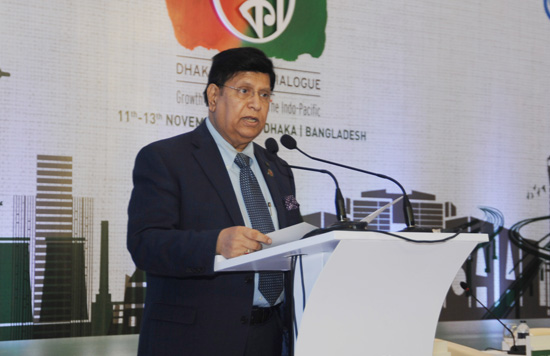DHAKA, Nov 13, 2019 (BSS) – Foreign Minister Dr A K Abdul Momen today said Bangladesh is open to any global and regional initiative which is economic in nature and helps economic development.
“There is enough evidence that increased intra-regional trade in our region can help sustain our individual country’s growth and support eradication of poverty … we need to have fair competition but not geo-strategic or political rivals,” he said while concluding three-day ‘Dhaka Global Dialogue’ at Hotel InterContinental here.
In today’s globalized world, Momen said, no single country can prosper alone. “What we need is to work closely – by drawing on each other’s strength, capabilities and endowments,” he observed.
“We must guard against the tendency to look at this region in respect of trade or security issues only,” he said, adding “We often look just in terms of the capacity of a few large economies or their needs.”
He suggested for addressing key concerns of smaller communities or relatively weaker economies also for making the world sustainable. “Countries should be engaged based on mutual trust and mutual respect, for mutual benefit,” he observed.
The foreign minister said many of the challenges that the region faces today, can best be addressed through collective efforts. “Trade and trade facilitation are increasingly becoming the key to our mutual prosperity,” he added.
Pointing that now-a-days the cross-border repercussion is a problem for all, he said regional efforts also contribute to achieve and sustain ‘peace, stability and progress’ within all communities under the coverage of regional frameworks.
“I personally believe and as a state policy we believe…peace stability is the essence of development, if there is no peace there cannot be development, look across the world, …wherever there is no peace they have been suffering,” he said.
Mentioning that issues of peace and stability are very critical for ensuring sustainable growth and development, Momen said: “To maintain sustainable development … it is essential to have peace and stability and we like to have peace and stability not only in my country, across region.”
Pointing that the key priority in Bangladesh foreign policy is to collectively take advantage of the resources and opportunities of the region and to counter unitedly the challenges, the foreign minister said that trans-national crimes, climate change, terrorism, protectionism, migration – all these important issues can be effectively managed only through convergence of regional initiatives.
Under the visionary leadership of Prime Minister Sheikh Hasina, Momen said, Bangladesh has been intensely pursuing regional integration for economic cooperation with the countries in South Asia and in South East Asia through SAARC and BIMSTEC process.
In South Asia, he said, through SAFTA, regional trade in goods and services is expected to rise robustly over the next few years while in South-East Asia, by next year, ASEAN would emerge as a seamless economic space up to Myanmar.
“Chinese ambitious BRI is already in place to connect Asia with Africa and Europe through land and maritime networks. The Indo-Pacific strategy is also in progress,” Momen observed.

State Minister for Foreign Affairs Md Shahriar Alam and Chairman, Observer Research Foundation Sunjoy Joshi also spoke at the concluding session titled ‘Convergence of Regional Initiatives for Optimising Common Benefits’ while Member of the Parliamentary Standing Committee on Foreign Ministry Nahim Razzaq moderated it.
Shahriar said the Dhaka dialogue has given some sort of clarity and better understating what Indo-Pacific really stands for. “We talked about Indo-Pacific …. no matter whether we are in full agreement with someone or we are still dwelling very idea of Indo-Pacific strategy or other idea vented, launched, tabled by the other countries,” he added.
Bangladesh Institute of International and Strategic Studies (BIISS) and India’s Observer Research Foundation (ORF) jointly organised the dialogue, which was participated by 150 foreign dignitaries from 45 countries.



